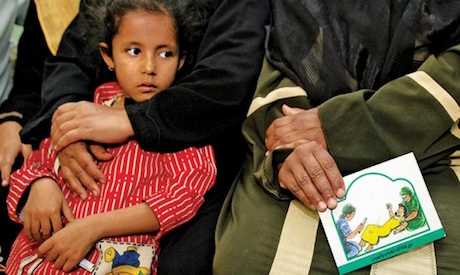
File Photo: A woman holds a card in her lap warning of the problems with female genital mutilation during a session to educate women in Minya, Egypt (Photo: Reuters)
The Egyptian Cabinet approved on Wednesday legal amendments toughening the penalty for female genital mutilation (FGM) to up to 20 years imprisonment instead of the previous maximum of seven years.
This is the second time authorities have toughened penalties for FGM (also known as female circumcision) in six years, and the decision comes one year after a teenager died in Upper Egypt while being subjected to the procedure.
The new amendment to Article 242 sets a minimum of five years in prison for removing, modifying or mutilating a part of a female’s genitals, and a minimum of seven years if the procedure causes permanent damage.
Doctors and nurses can face 10 years in prison if they perform the procedure and it results in permanent damage.
If a victim dies from undergoing FGM, then the perpetrator can face 10 years if they are not a medical practitioner, and 15 to 20 years if they are a doctor or nurse.
Those convicted of performing circumcision would be disallowed from practicing their profession for five years and the institution where the circumcision was performed would be closed.
The amendments also state that the person upon whose request the circumcision is carried out also faces a prison sentence.
Those who promote, encourage, or incite others to commit FGM also face prison terms, even if their actions do not directly lead to the crime being committed.
The case of Nada Hafez, a 14-year-old girl who died due to FGM last year in Upper Egypt’s Assiut, was not the first of its kind in the country.
Although the practice has decreased in the country in recent years, many people, especially in rural areas, still subject their daughters to it, believing that is it a religiously mandated practice.
Dar Al-Iftaa, the central authority in Egypt in charge of issuing religious edicts (fatwas), has repeatedly stated that FGM is prohibited by Islam.
The first conviction for performing FGM in Egypt was in January 2015, seven years after the practice was first criminalised in 2008.
According to the health ministry in 2018, the rate of FGM among teenage girls aged 15 to 17 fell from 74 percent in 2008 to 61 percent in 2014.
Short link: